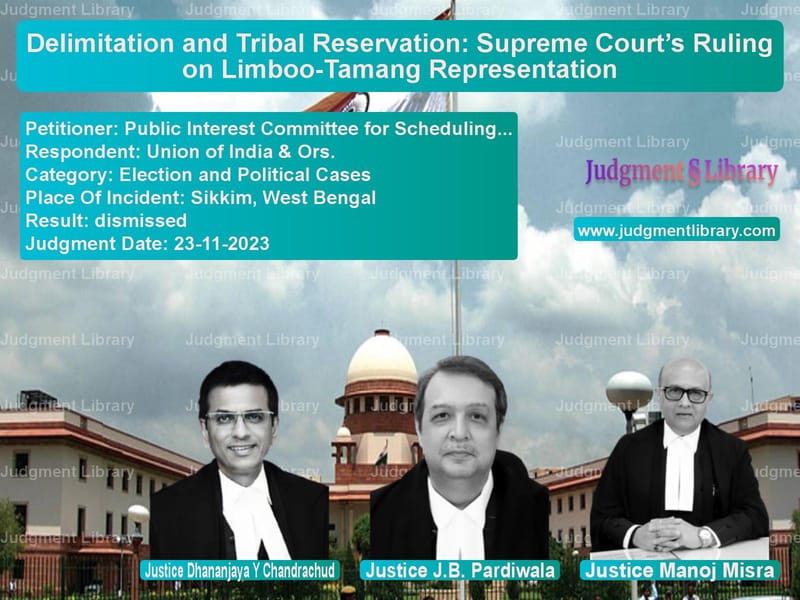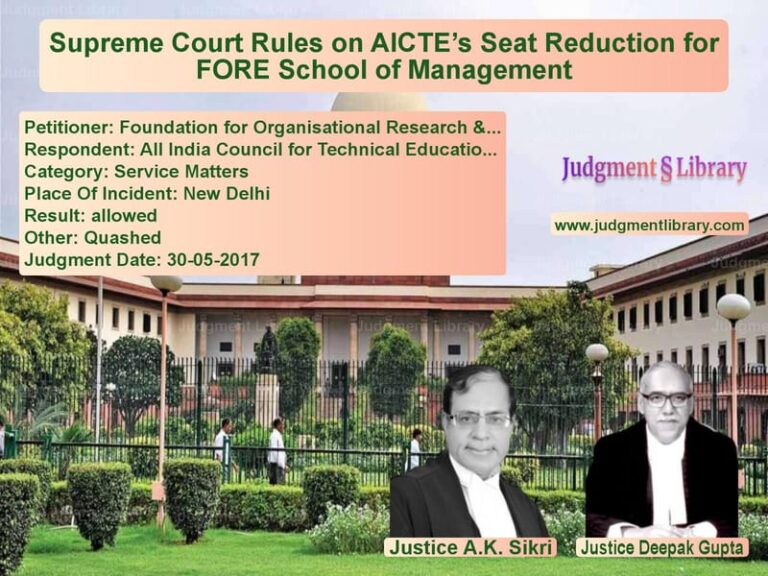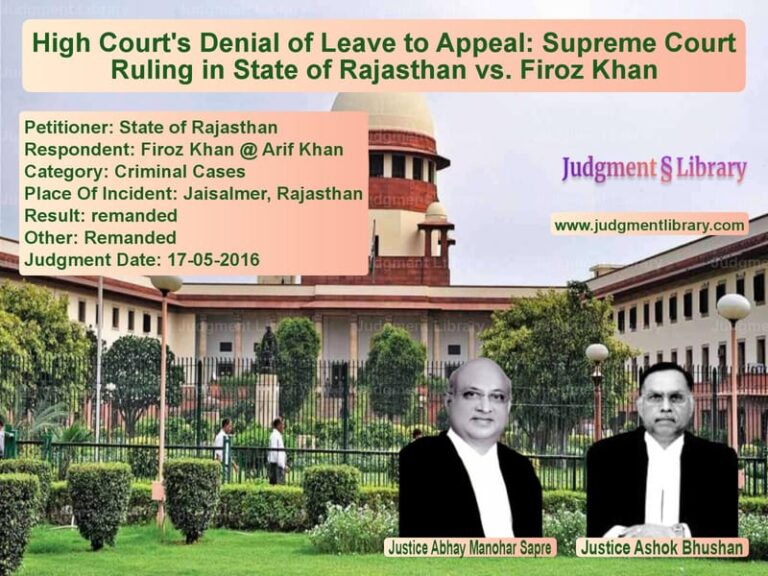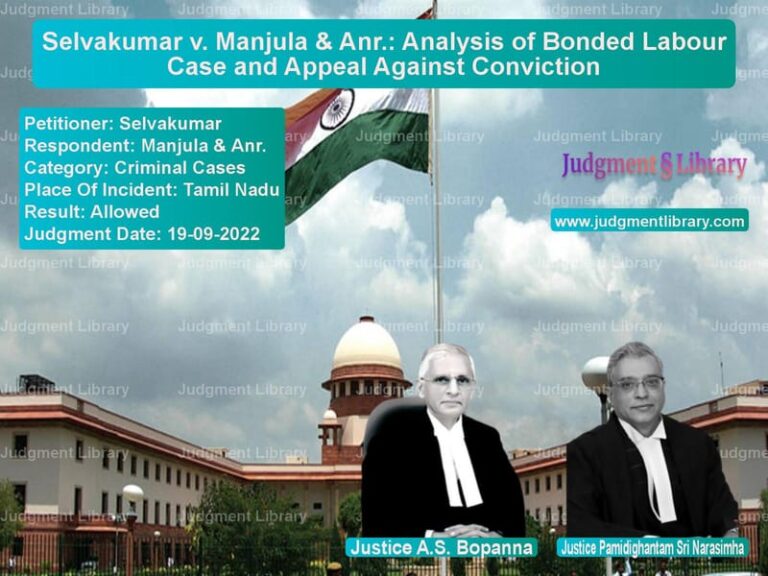Delimitation and Tribal Reservation: Supreme Court’s Ruling on Limboo-Tamang Representation
The case of Public Interest Committee for Scheduling Specific Areas and Anr. vs. Union of India & Ors. involves a significant constitutional and electoral dispute concerning the reservation of seats for the Limboo-Tamang Scheduled Tribes in Sikkim’s Legislative Assembly. The Supreme Court examined whether the Delimitation Commission and the Election Commission had the authority to amend prior delimitation orders to accommodate newly recognized Scheduled Tribes.
Background of the Case
The petitions were filed under Article 32 of the Constitution, raising concerns about the lack of proportional representation for the Limboo-Tamang Scheduled Tribes in Sikkim’s Legislative Assembly. The petitioners challenged the Delimitation Notification of 2006 and the Delimitation Order of 2008, arguing that these orders did not reflect the amended status of the Limboo-Tamang tribes as Scheduled Tribes following the Scheduled Castes and Scheduled Tribes Orders (Amendment) Act, 2002. The petitioners also sought to declare Section 7(1A) of the Representation of the People Act, 1950, as unconstitutional for failing to include these tribes in the reserved category.
Petitioner’s Arguments
The petitioners, represented by Mr. Prashant Bhushan and Ms. Pritika Kumar, argued:
- Constitutional Mandate: Articles 330 and 332 mandate proportional representation for Scheduled Tribes in legislative bodies. The Delimitation Orders of 2006 and 2008 violated this mandate by failing to include Limboo-Tamang tribes.
- Duty of the Election Commission: Under Article 324, the Election Commission has a duty to ensure proper representation, and it must use its powers under Section 11 of the Delimitation Act to correct the omission.
- Precedent in Uttar Pradesh: The case of Virendra Pratap and Another vs. Union of India established that the Election Commission must update representation for newly recognized Scheduled Tribes.
- Legislative Inaction: Despite the 2002 amendment recognizing the Limboo-Tamang tribes, no steps were taken to reflect their representation in the Assembly.
Respondent’s Arguments
The Union of India and the Election Commission countered:
- Limited Power of Election Commission: The Election Commission cannot alter delimitation orders without enabling legislation. Parliament must amend the Representation of the People Act for any such changes.
- Delimitation is a Legislative Process: The Delimitation Act, 2002, and the Representation of the People Act, 1950, only allow readjustment based on the last census, which was in 2001.
- Failure of Ordinances: The government attempted to introduce ordinances in 2013 to enable readjustment, but they lapsed without becoming law.
- Judicial Review Limitations: Under Article 329, courts cannot interfere in matters related to delimitation once finalized.
Key Legal Issues Considered
1. Can the Delimitation Commission Amend the 2006 Notification?
The Court examined whether the Delimitation Commission had the power to revise the 2006 Notification after publication. The Delimitation Act, 2002, does not provide for amendments once final orders are issued.
Read also: https://judgmentlibrary.com/election-nomination-dispute-supreme-court-reinstates-mlas-victory/
2. Can the Election Commission Modify the 2008 Order?
The Court analyzed the Election Commission’s powers under Article 324 and the Representation of the People Act. It found that the Election Commission could not alter delimitation results unless Parliament passed an enabling law.
3. Should the Government Act to Provide Proportional Representation?
The Court examined whether the Union Government was constitutionally obligated to act. While it recognized the need for reservation adjustments, it held that such changes require legislative intervention.
Supreme Court’s Verdict
The Supreme Court declined to issue a writ of mandamus to amend the delimitation orders but made the following observations:
- Judicial Review is Limited: The Court cannot interfere with delimitation once finalized under Article 329.
- Legislative Amendment Required: Any changes to the representation of newly recognized Scheduled Tribes must come through Parliament.
- Government Should Act: The Union Government must take necessary legislative steps to ensure proportional representation.
- No Disruption of Upcoming Elections: The judgment does not interfere with scheduled elections.
Key Takeaways from the Judgment
- Delimitation is Final: Once delimitation orders are published, they cannot be challenged in court.
- Election Commission’s Role is Limited: The Commission cannot alter representation without a legal mandate.
- Parliament’s Role is Crucial: Legislative amendments are necessary to ensure fair representation.
- Future Adjustments Must Be Considered: The government must review how newly recognized Scheduled Tribes are represented in electoral constituencies.
This ruling clarifies the legal framework governing delimitation and the representation of Scheduled Tribes, reinforcing the need for legislative action to address emerging demographic realities.
Petitioner Name: Public Interest Committee for Scheduling Specific Areas and Anr..Respondent Name: Union of India & Ors..Judgment By: Justice Dhananjaya Y Chandrachud, Justice J.B. Pardiwala, Justice Manoj Misra.Place Of Incident: Sikkim, West Bengal.Judgment Date: 23-11-2023.
Don’t miss out on the full details! Download the complete judgment in PDF format below and gain valuable insights instantly!
Download Judgment: public-interest-comm-vs-union-of-india-&-ors-supreme-court-of-india-judgment-dated-23-11-2023.pdf
Directly Download Judgment: Directly download this Judgment
See all petitions in Legislative Powers
See all petitions in Public Interest Litigation
See all petitions in Judgment by Dhananjaya Y Chandrachud
See all petitions in Judgment by J.B. Pardiwala
See all petitions in Judgment by Manoj Misra
See all petitions in dismissed
See all petitions in supreme court of India judgments November 2023
See all petitions in 2023 judgments
See all posts in Election and Political Cases Category
See all allowed petitions in Election and Political Cases Category
See all Dismissed petitions in Election and Political Cases Category
See all partially allowed petitions in Election and Political Cases Category







